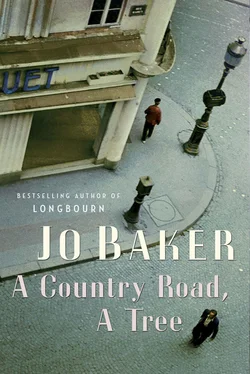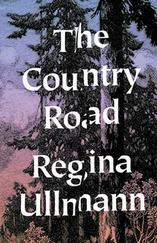“One hears that things are very bad,” someone concedes, “in France.”
His mother tugs at the edges of her cardigan and glances up at the sky and says, do you know, she thinks it might be coming on to rain, and someone says that it certainly looks that way; and conversation gathers round this thread like crystals and accumulates, as though everything were normal here and as though the world was the same all over and looked like this; as if there was tea and cake for everyone, and one last patch of sunshine on the lawn before another summer’s done.
And for now, what can he do but accept the fiction, however temporarily, and comply with it. He lifts his cup, swallows his tea down. He forks the cake into bits, and crumbs, and spears a fragment and places it in his mouth. It dissolves there like a communion wafer. It is good. He clears his plate.
She watches him discreetly as he eats, a glance and then another glance; a smile caught on her neighbour’s smile, the happiness that must of course be felt to have him home again. But underneath it all, underneath every swollen moment of his presence here, there is an ache for him that begins in the middle of her chest and rises to her throat and squeezes out her breath. To see him now, like this, a gaunt, worn creature made of rope and sticks, it has her heart turned sideways in her. Always the hardest path. Always the highest tree. He’d fall, and having fallen, would dust himself off and climb the tree again. When the tree itself had no need to be climbed at all; when there were lawns to run on and games of tennis and croquet and company; when there were so many other, more comfortable things, if he could simply choose them. But falling never knocked that strange determination out of him, and neither could she.
So she must learn. She will not win this war. But perhaps there can be peace.
—
He goes. Down the pavement and across the road; simply going, making distance. Even now after all these years he could still be hastening to catch up with his father, to fall in step with him in silence, walking away from this tangled mother-love, up to where things fall clear and the track rises through the cotton grass and the curlews calling; his father, gazing at the ground, would stop, and dig up a small stone with a fingernail and rub it clean, and pocket it in case of later need.
He searches out his own small stone in his pocket, the precious one a child’s clean eye had selected from all the stones at Greystones. He turns it over in his fingertips.
He misses Paris. Paris under any circumstances. Paris with its bones sticking through its skin, he’d take that over this unruffled plump buck Dublin that is making him gag on butter and milk and cream. That will not let him leave. There are no travel permits to be had, not for failing feckless writers. His teeth hurt like hell, his joints are full of grit, he’s short of breath, and he knows he is in no shape for anything, and is no good to anyone at all, and that France in ruins needs him less than she did when she was whole. France needs doctors, nurses, surveyors, engineers. The likes of him would only clutter up the place.
Today has been difficult.
He must grant himself that.
One would think these things got easier with practice, but they don’t. Failure still takes some accommodating. Over time, that stab of shame will dull to a low guilty ache, and he’ll go on with it like that, and get used to it. His book, the book written in Roussillon, the book that kept him sane, the book that, as Anna Beamish said, he had to write like snails have to make slime. Watt. Nobody wants it. Nobody will publish it. Yet another rejection came this morning. Nicely worded, and on not bad paper for the times that are in it. But a rejection nonetheless. And that, after all, is the thing about slime. He might have to make it, but nobody else is obliged to buy it off him.
He presses on. The breath heaves in and out of him. If he can tire himself sufficiently, he might just manage eventually to sleep.
—
Rigid in the dentist’s chair, his skull pressing hard against the headrest, his jaw is locked open. He can taste his own rottenness, smell it as he breathes. His mouth crawls with silvery pains; they’re everywhere, like ants.
The dentist’s face is practically in his mouth; Ganley pokes and tugs with his little wire sickle and the pain sharpens and turns red. The eyes narrow; the wire digs in under gum and he grips the armrests. This is nothing really; whatever happens here, however much it hurts, this is nothing very much at all.
“So you were in France for the duration, I believe?”
He swallows spit, open-mouthed. There are three fingers and a metal scraper in his mouth: he can’t even nod.
“Uh.”
The wire scrapes in below the gum again and the pain is brilliant, and he tastes blood, and it doesn’t matter.
“And you haven’t had these looked at, during all that time?”
It didn’t even cross his mind. “Uh.”
Ganley chinks the scraper down on a metal tray.
Released, he fumbles out his handkerchief, dabs his lips.
“Rinse, please.”
He rinses. The pinky-purple fluid stings. He spits into the bowl. The white ceramic streaks with blood; the blood oozes towards the plughole. He has known for a while that things in his mouth are not as they should be; the snags and edges, the deep throb of nerve, the tender itchy gum: there was more going on than there should have been. The clank and clatter of a sucking stone around his mouth can’t have helped. It had kept him going, but at a deficit. He will pay for it now.
“We see a lot of this at the minute,” Ganley says. He’s at the basin, scrubbing his hands.
“What’s that, then?”
“These accumulated problems. Soldiers and POWs have mouths like yours. Neglect, poor diet — over time, well, there’s just massive decay and infection. One sees it in country folk too. They’ll come up to town with twenty years’ worth of rot. It’ll already be wearing you down and affecting what you can and can’t eat. Isn’t that right?”
He nods.
Ganley dries his hands, sets the towel aside. “And every day you go on like this you’re risking septicaemia, and then, well, all bets are off. So what we need to do, and in pretty short order, is clean things up in there. A good few of these will have to go…”
As the dentist talks, his tongue slides around his teeth, up the smooth fronts of his top incisors, one and then the other; it presses into their concave backs. They’d been serrated, keen, pressing through the gum when he was seven years old; now their edge is worn flat and blunt and chalky-porous. And the right one gives under the pressure of his tongue. Like a tree with the roots dug out from underneath it.
“…pain, but we’ll put you under,” the fellow’s saying. “You’ll be sore for a while afterwards, but gum tends to heal pretty well once the source of infection’s gone. We’ll get some bridgework fitted and you’ll be grand.”
He swallows. It doesn’t matter. Not the pain, not the loss. It’s tiny. His mite dropped into the kitty, his little bit of suffering to help pay off an outraged, vengeful God.
“And the charge for that?”
“You’ll need to talk to Miss Cavendish. She can take you through the payments.”
He nods. He hasn’t properly gathered what will be removed and what will remain; it hardly matters. His mother will have to be consulted; he won’t be able to afford it without her help. He will be leathery and cadaverous, scarred, toothless, already decaying, staggering along to get into her grave before she can.
—
Now his stomach is sick with blood, and the inside of his mouth is cavernous and far too wet, and his tongue has become a strange mollusc that is living in it. His lips are dry and cracked and overstretched. He should have accepted Frank’s offer of a lift. He’s still dazed with nitrous oxide and here and there his gums are stitched and prickly, and there are craters too where the blood congeals and lifts in lumps and his slug of a tongue will not leave anything alone, and the street is busy and the sky is a bitter pearl-grey and he is stumbling along making a show of himself, he’s sure of it. It’s as much as he can do to walk a straight line, to not vomit blood into the gutter. The pain is distractingly various. He aches, he stings, he throbs, is sore. This has been a very expensive and thorough assault upon his person. He may as well have been mugged.
Читать дальше










